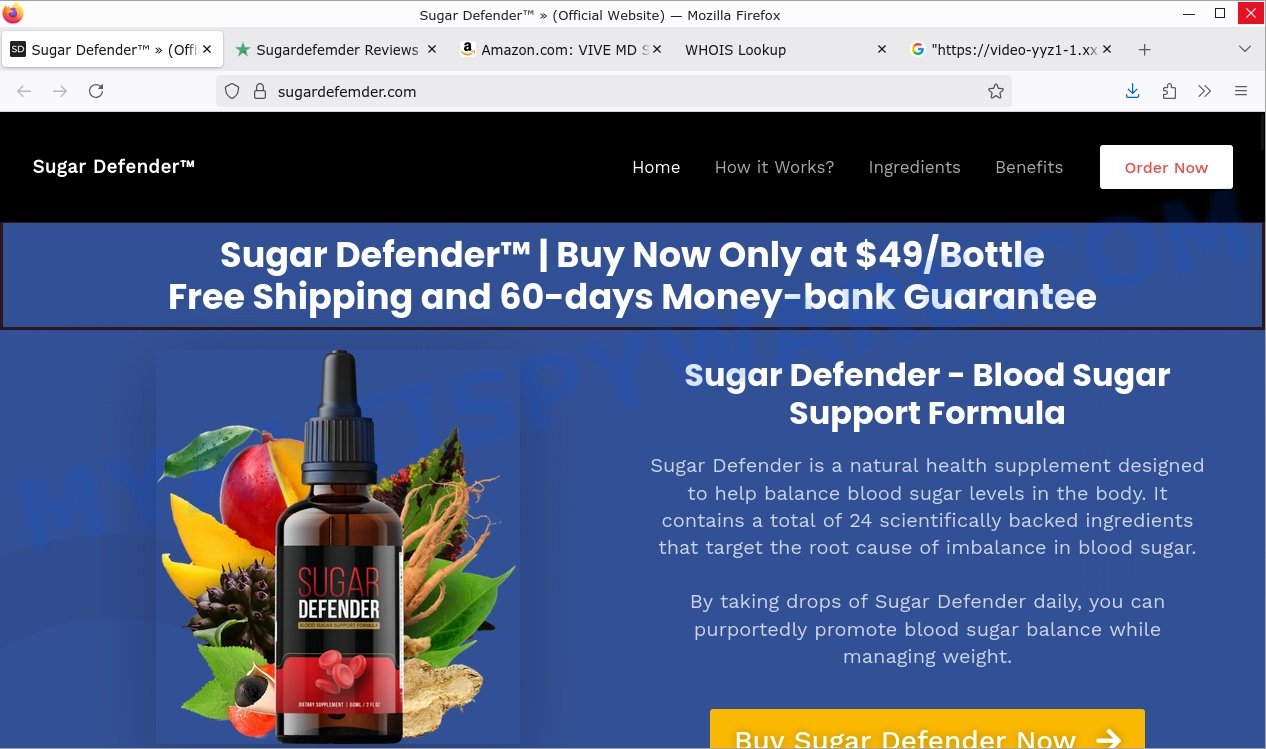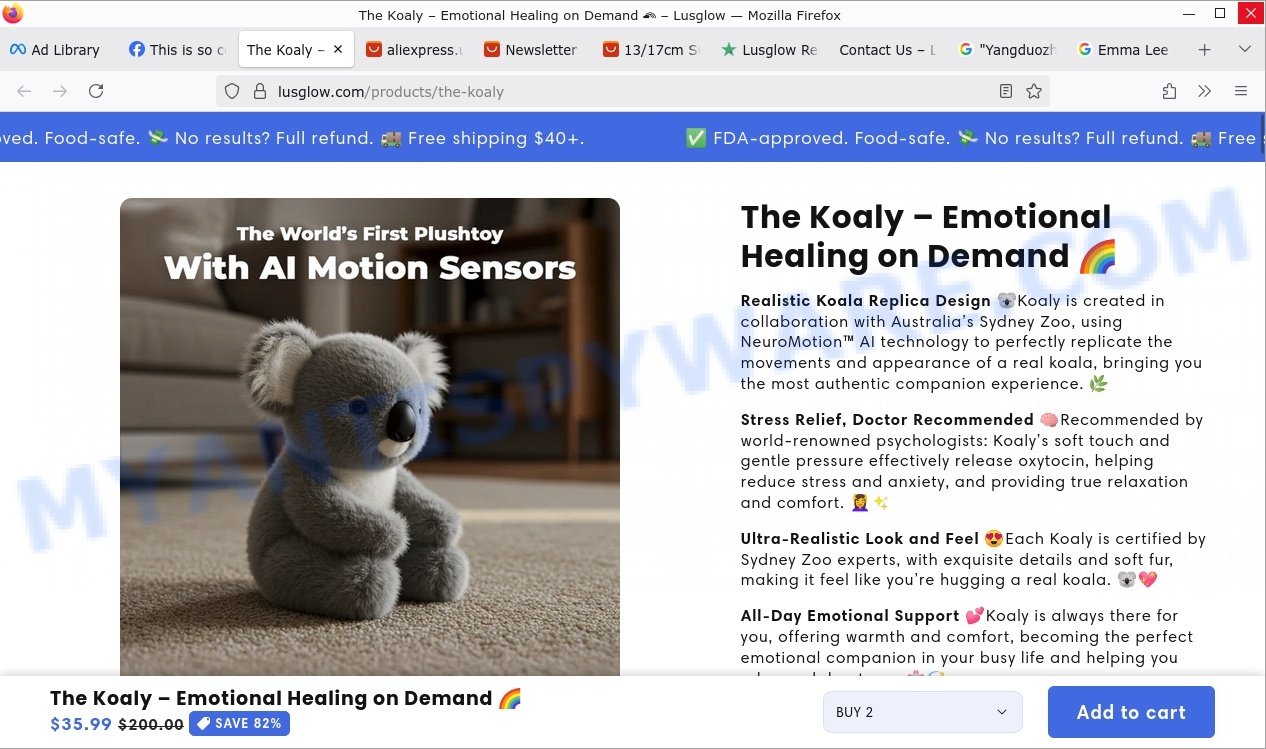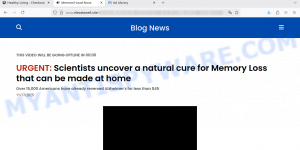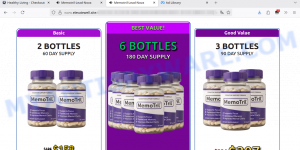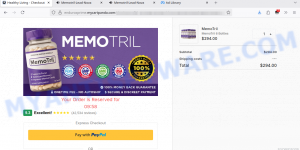MemoTril is a prime example of a memory-boosting scam dressed up as a breakthrough “brain ritual” cure. Marketed heavily through Facebook ads and slick videos, it promises to reverse Alzheimer’s and erase brain fog with a simple at-home formula—claims that are completely unsupported and rely on fake endorsements and fabricated scientific backing.
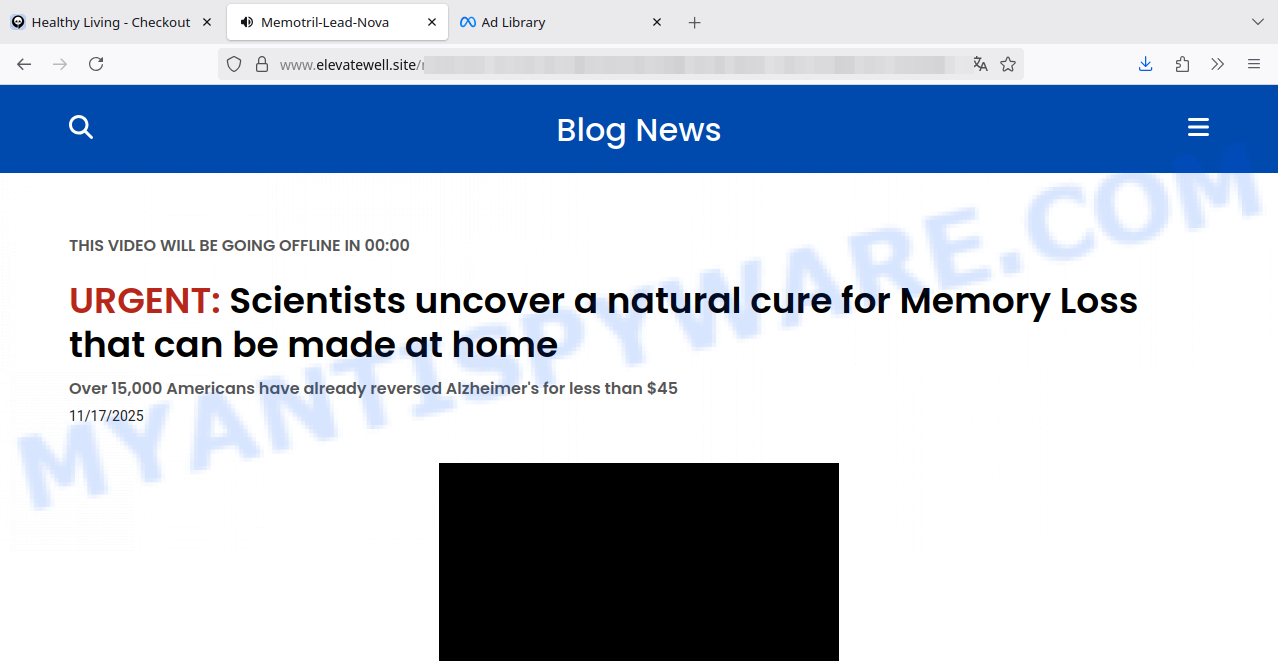
The whole scheme hooks users with vague fear tactics about early dementia signs, then funnels them to a shady website pumping out a dramatic sales video full of bogus testimonials, CNN-style graphics, fake celebrity endorsements, and references to reputable institutions like Harvard and Bill Gates—with no real evidence behind any of it. In reality, MemoTril is just a product pushed through an untrustworthy checkout system known for customer complaints, no genuine clinical proof, and scripted “user” reviews designed to convince people to part with their money.
At its core, MemoTril preys on vulnerable consumers desperate for a cure, trading on false hope with a fabricated “secret brain ritual” that doesn’t actually exist. The takeaway? If a memory supplement sounds like a miracle done overnight, it’s almost certainly too good to be true—and could cost more than just your cash. Always turn to real medical advice rather than slick marketing funnels promising cures with zero accountability.
💡 Heads-up: Similar Scams Are Everywhere. MemoTril is not unique. It is one of many fake supplements, gadgets, and other schemes we expose in our Fact Checks section. All of them aim to grab your personal data or money. The people behind these scams run slick websites, spread bogus promo codes, and even pose as trusted brands or experts. Below are a few recent scams that follow the same playbook as MemoTril: Clara Hart Minnesota, GlucoDefense7, PetsBoro Bunny Pal, ChronoScript, SampleGifted.com.
Table of Contents
🚨 Is MemoTril an Effective Cognitive Support Formula That Reverses Memory Loss?
MemoTril is promoted as a “cognitive support formula” supplement claiming to restore memory, reverse Alzheimer’s disease, and clear brain fog through an easy “brain ritual” at home. However, investigations into the marketing materials and sales funnel reveal that MemoTril is pushed using deceptive tactics typical of health scams. These tactics target vulnerable individuals seeking quick and effortless solutions for blood sugar balance, blood pressure control, and weight loss, but without reliable evidence or verified results.
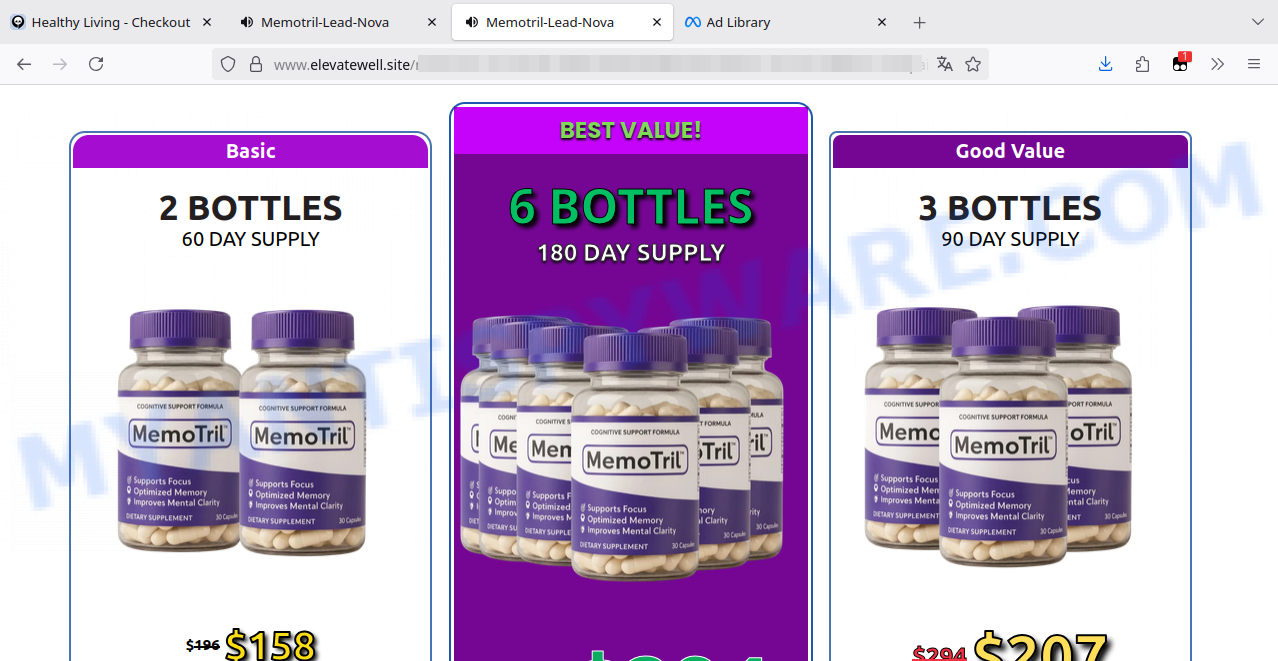
Fact check:
- 🌐 Promotional Tactics: MemoTril is advertised via sponsored social media posts leading to a landing page designed to mimic legitimate health news. The page uses fabricated urgency and celebrity endorsements—such as false references to Bill Gates and CNN’s Dr. Sanjay Gupta—to create illusion of credibility.
- ⭐ Testimonials and Reviews: Comment sections and testimonials on the sales page appear scripted and lack independent verification. They serve as social proof but are not from real users or credible sources.
- 🔒 Website Claims: Claims of “FDA Approved Facility”, “GMP Practices”, “Non-GMO”, and “Money Back Guarantee” badges appear on checkout pages hosted via Cartpanda, a third-party platform known for aggressive supplement marketing with questionable customer service standards.
- ⚠️ Health Claims: Assertions like reversing Alzheimer’s disease and improving memory in days come without scientific backing or citation of clinical trials. No authentic research from Harvard, Yale, Emory, or the Gates Foundation supports these claims.
- 📉 Product Offer: The product is sold in multi-bottle packages at inflated prices with discount labels and countdown timers to induce hurried purchases, typical pressure tactics in scam funnels.
- 👤 Lack of Transparency: No verifiable contact information, manufacturer details, or independent clinical evidence is provided. The product’s promised “brain ritual” is never concretely disclosed or demonstrated.
- 🔗 Misused Associations: Names like Bill Gates, CNN, and major universities are falsely linked through fabricated graphics and narration, with no actual endorsement or involvement.
In summary, MemoTril’s promotion embodies many red flags of a high-risk health scam. The product’s efficacy claims lack credible evidence, rely heavily on misleading endorsements, and employ manipulative sales tactics designed to exploit consumers’ fears and hopes about dementia and memory loss. Consumers seeking support for cognitive health should consult qualified medical professionals and avoid anonymous, unsubstantiated online offers promising miracle cures.
🕵️♂️ How the MemoTril Memory Cure Scam Operates
Scammers behind MemoTril begin by launching targeted ads on social media platforms such as Facebook, often featuring video of elderly individuals alongside alarming messages about early dementia signs. These ads promise miraculous results—rapid memory restoration, reversal of Alzheimer’s, and mental clarity improvements—using fear-based hooks like “five common words seniors mispronounce years before memory loss”. They rely heavily on fake testimonials, sensational claims, and pseudo-scientific jargon to attract vulnerable people seeking quick fixes for memory problems.
When users click on these ads, they are directed to deceptive landing pages under URLs like `elevatewell.site` that mimic legitimate health-news sites but serve only as sales funnels. The information on these pages is often embedded in videos rather than standard text, making it difficult to independently verify claims. The site’s design tries to create a veneer of credibility, suggesting endorsements by reputable institutions and experts, though no verifiable evidence is provided.
A typical tactic used on these pages is to falsely suggest backing by well-known organizations or professionals. For example, the scam claims connections to Harvard, Yale, Emory, the Gates Foundation, or CNN’s “chief neurosurgeon” Dr. Sanjay Gupta, none of which are confirmed. They also show logos and badges implying “FDA Approved Facility”, “GMP Certified”, and “Made in USA”, though dietary supplements like MemoTril are seldom FDA-approved and these claims are typically fabricated to build false trust. Urgency is created by countdown timers and phrases like “Limited Time Offer” to pressure quick purchases. Discounts and “risk-free” money-back guarantees further lure consumers, yet the refund process is often complicated or nonexistent.
Testimonial sections on these sales pages display overwhelmingly positive “user comments” full of praise and dramatic recovery stories, presented as if posted by thousands of satisfied customers. However, independent review platforms either show no mention of MemoTril or reveal negative feedback, highlighting that these testimonials are likely fabricated or scripted.
After customers buy MemoTril, they are often targeted with upsells or membership plans disguised as discounted bundles or free shipping offers. Many also report unauthorized recurring charges and poor customer service, leaving them frustrated and financially harmed.
In summary, the MemoTril scam depends on manipulative social media ads, misleading websites disguised as news sources, fake endorsements, and deceptive certification badges to trick consumers into purchasing a product with no scientific proof of effectiveness. Victims are left disappointed, out of pocket, and distracted from seeking legitimate medical care for memory loss and dementia.
😱 What to Do If Scammed
If you find yourself ensnared by the MemoTril Scam, immediate action is crucial. Here’s what you should consider doing:
🛑 Stop Further Transactions
The first step is to halt any additional transactions that might be in process. Contact your bank or credit card provider and inform them that you’ve fallen victim to a scam. They can help by blocking the card or reversing any unauthorized transactions.
📞 Report the Fraud
File a report with your local police and provide all the available evidence, such as screenshots, emails, and website URLs. Additionally, report the scam to online portals like the Better Business Bureau (BBB) at www.bbb.org or the Federal Trade Commission (FTC) at reportfraud.ftc.gov. If you’re in another country, reach out to your national consumer protection agency.
💻 Take Screenshots
Before the scam website gets taken down or changes, make sure to capture screenshots of your transactions and communications. These can serve as evidence if you decide to pursue legal action.
⚖️ Consult Legal Advice
Speak to a legal advisor about your situation. While pursuing legal action may be time-consuming and costly, it could be a possible avenue for recovering your lost money.
📢 Share Your Experience
Use social media platforms to share your experience and warn others about the scam. Your story could prevent someone else from falling victim to the same or similar scams.
Summary Table
| Factor | Observations | Impact on Legitimacy |
|---|---|---|
| Product Description | MemoTril is promoted as a supplement that can reverse Alzheimer’s, restore memory, and clear brain fog through a secret “brain ritual” made at home. The product claims are based on fake endorsements and unproven research from well-known institutions and figures like Harvard, Yale, Bill Gates, and Dr. Sanjay Gupta. | Negative (False medical claims and misleading endorsements) |
| Marketing Channels | The scam starts with a sponsored Facebook ad leading to a fake news-style website (`elevatewell.site`) that uses a long video to push the product. The story includes invented warnings, fake expert stories, and uses fear about dementia to attract clicks. Finally, users are sent to a Cartpanda checkout page to buy the product. | Negative (Deceptive advertising funnel and fake news tactics) |
| Reviews and Comments | The page shows a comments section with positive testimonials and high ratings, but these are part of the sales page and look scripted, not from real customers or verified platforms. | Negative (Fabricated customer feedback and fake social proof) |
| Pricing and Sales Tactics | MemoTril’s packages are offered with large discounts, countdown timers, and pressure to buy quickly. The sales page shows “money back guarantees” but payment goes through Cartpanda, a platform tied to multiple consumer complaints. | Negative (High-pressure sales tactics and unreliable refund process) |
| Checkout and Payment Platform | The checkout is handled by Cartpanda. The checkout page uses fake badges (FDA, GMP) to appear trustworthy, but lacks real company information. | Negative (Suspect payment platform with poor consumer protection) |
| Product Source and Safety | No real proof of safety, clinical trials, or FDA approval. The product is marketed on false claims with no official certifications or transparent manufacturing details. | Negative (Unverified product origin and safety claims) |
| Use of False Endorsements | Labels and names like Bill Gates, Gates Foundation, CNN, and universities are falsely used to build credibility. No official endorsements or facts back these associations. | Negative (Misuse of reputable names to mislead buyers) |
| Website Transparency | The website hides real business information, uses anonymous domains, and presents itself as a news blog rather than a sales page to confuse visitors. | Negative (Lack of transparency and misleading website design) |
| Risk to Consumers | Consumers risk wasting money on ineffective pills, delaying real medical care, exposing payment data to risky platforms, and facing difficulty getting refunds or support. | Negative (Potential financial loss, health risk, and privacy issues) |
Conclusion
The MemoTril Cognitive Support Formula is a scam, employing fake endorsements, fabricated testimonials, and misleading marketing tactics to appear credible. The operators behind MemoTril use false claims, including unverifiable associations with prestigious institutions and public figures, to lure vulnerable consumers searching for memory and cognitive health solutions.
Instead of providing a legitimate treatment or cure for dementia or Alzheimer’s, MemoTril’s sales funnel relies on scare tactics, urgent messaging, and deceptive “brain rituals” promised to reverse memory loss in days. The product’s website mimics trustworthy medical news sites and displays bogus badges such as “FDA Approved Facility,” “GMP Certified,” and “Non-GMO” to feign authenticity—despite the complete lack of genuine scientific backing or regulatory approval.
Bottom Line: Avoid purchasing MemoTril Cognitive Support Formula. Always verify health supplements making extraordinary claims, especially when sold through anonymous websites that use fabricated testimonials, manipulated content, and fake expert endorsements. Stay vigilant and consult qualified healthcare professionals rather than trusting secret “brain rituals” or miracle supplement offers that are designed to deceive and defraud.

